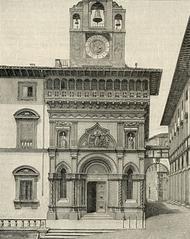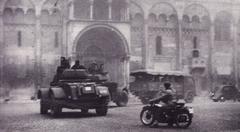
Arezzo Railway Station: Visiting Hours, Tickets, and Travel Guide
Date: 04/07/2025
Introduction
Located in the heart of Tuscany, Arezzo Railway Station (Stazione di Arezzo) is much more than a transportation facility—it is an essential gateway to the cultural, historical, and artistic wonders of Arezzo and the broader Tuscan region. Since its inauguration in 1866 as part of the Florence–Rome railway, the station has evolved into a pivotal node in Italy’s rail network, connecting millions of travelers annually to both regional and national destinations (Wikipedia; ItaliaRail; TFT Timetables). Its modern amenities, full accessibility, and integration with various transport modes make it an ideal starting point for exploring Arezzo’s rich cultural tapestry, including landmarks like Piazza Grande and the Cathedral of San Donato (Visit Arezzo). This comprehensive guide covers the station’s history, facilities, ticketing, nearby attractions, and practical travel advice for a seamless visit.
Table of Contents
- Origins and Early Development
- Unique Multi-Company Junction
- Architectural and Structural Evolution
- Visiting Hours and Accessibility
- Tickets and Travel Information
- Integration with Regional and National Networks
- Nearby Attractions and Arezzo Historical Sites
- Passenger Traffic and Modernization
- Travel Tips and Visitor Information
- Frequently Asked Questions (FAQ)
- Preservation and Future Prospects
- Visual Media and Interactive Elements
- Arezzo Cathedral: Visitor’s Guide, History, and Transportation Connections
- Summary and Recommendations
- References and Further Reading
Origins and Early Development
Arezzo Railway Station was inaugurated on March 15, 1866, marking a transformative era in the city’s connectivity and economic growth. As part of the historic Florence–Rome line, the station quickly became a catalyst for Arezzo’s integration with the rest of Tuscany and Italy. The original infrastructure was notable for its ability to handle both standard and narrow-gauge trains, with a three-rail track system accommodating different railway companies and routes (Wikipedia).
Unique Multi-Company Junction
From 1932 to 1944, Arezzo Railway Station was distinguished as the terminus for four separate railway lines, each managed by a different company. Alongside Ferrara, it was the only Italian city to serve as such a multi-company junction. These included the main Florence–Rome line, the Arezzo–Stia and Arezzo–Sinalunga lines (now operated by TFT), and the narrow-gauge line to Fossato di Vico. This convergence underscored Arezzo’s strategic importance in central Italy’s transportation landscape (Wikipedia).
Architectural and Structural Evolution
The station’s infrastructure has been continuously adapted to meet evolving transportation demands. Early 20th-century features such as a pedestrian overpass (relocated in 1953) reflect its growth, while subsequent expansions have increased passenger capacity and comfort (Wikipedia). Today, classified as a “Gold” category station by Rete Ferroviaria Italiana (RFI), Arezzo Railway Station is recognized for its high service standards and comprehensive passenger amenities (RFI Stations). The forecourt is graced by a full-scale replica of the Chimera of Arezzo, symbolizing the city’s ancient Etruscan roots.
Visiting Hours and Accessibility
- Station Hours: Open daily from 5:00 AM to midnight.
- Ticket Office: 6:00 AM to 10:00 PM.
- Self-Service Machines: Available 24/7.
- Accessibility: The station is fully accessible, with ramps, elevators, tactile paths, step-free access, and accessible restrooms. The Sala Blu RFI service provides assistance for travelers with reduced mobility when arranged in advance (RFI Stations).
Tickets and Travel Information
Tickets can be purchased:
- At the Station: Via staffed counters or self-service machines.
- Online: Through official platforms such as Trenitalia, TFT, and Omio.
- Mobile Apps: Including TABNET and others.
Prices depend on destination, train type, and class. Booking in advance is recommended for high-speed or long-distance trains, particularly during peak seasons.
Integration with Regional and National Networks
Arezzo Railway Station is a major hub on the Florence–Rome line, one of Italy’s most critical north-south rail corridors (Nomads Travel Guide). The station also serves as the terminus for the Arezzo–Stia and Arezzo–Sinalunga lines, connecting to the Casentino and Valdichiana valleys. The integration with the high-speed “Direttissima” line allows for Frecciarossa and Intercity services, providing rapid links to cities such as Milan, Naples, Venice, Turin, and Perugia (Wikipedia).
Nearby Attractions and Arezzo Historical Sites
Arezzo Railway Station is a convenient entry point to:
- Piazza Grande: The city’s medieval center, known for its architecture and market.
- Cathedral of San Donato: A prime example of Gothic architecture.
- Basilica of San Francesco: Home to Piero della Francesca’s Renaissance frescoes.
- Etruscan and Roman Archaeological Museum: Showcasing the region’s ancient history.
Guided tours often begin near the station and include major landmarks and photo opportunities such as the Chimera statue (Visit Arezzo).
Passenger Traffic and Modernization
Handling over 4 million passengers annually, Arezzo Railway Station is a linchpin in Tuscany’s transport network. Recent modernization efforts have upgraded ticketing systems, accessibility, and passenger services. Its proximity to the historic center and frequent services from major cities enhance its role as a gateway for tourists and locals alike (Invitation to Tuscany).
Travel Tips and Visitor Information
- Best Time to Visit: Spring and early autumn for pleasant weather and fewer crowds.
- Getting Around: Bus stops, taxi stands, and bike-sharing are located outside the station.
- Luggage Storage: Self-service lockers and staffed counters are available.
- Special Events: Check for festivals like the Fiera Antiquaria or Giostra del Saracino.
Frequently Asked Questions (FAQ)
Q: What are the Arezzo Railway Station visiting hours?
A: 5:00 AM to midnight. Ticket offices: 6:00 AM to 10:00 PM.
Q: How do I buy tickets?
A: Online, at the station, or via mobile apps.
Q: Is the station accessible for disabled travelers?
A: Yes, with ramps, elevators, tactile paths, and assistance available.
Q: What sites are near the station?
A: Piazza Grande, Cathedral of San Donato, Basilica of San Francesco, and the Archaeological Museum.
Q: Are guided tours available?
A: Yes, local operators offer tours starting from or near the station.
Preservation and Future Prospects
While the station has embraced modernization, it preserves its historical character, with features like the Chimera replica honoring Arezzo’s heritage. Continued investments focus on enhancing accessibility, service frequency, and sustainability (Wikipedia).
Visual Media and Interactive Elements
Explore Arezzo Railway Station virtually through regional tourism sites. Images with descriptive alt text (e.g., “Arezzo Railway Station visiting hours,” “Arezzo historical sites”) improve accessibility and SEO.
Alt text: Exterior view of Arezzo Railway Station showcasing its entrance and signage.
Alt text: Historic Piazza Grande with medieval buildings and bustling market in Arezzo.
Alt text: Interior frescoes of the Basilica of San Francesco, Arezzo.
View Arezzo City Map and Virtual Tour
Arezzo Cathedral: Visitor’s Guide, History, and Transportation Connections
History and Cultural Significance
Arezzo Cathedral, dedicated to Saints Donatus and Peter, is a Gothic masterpiece that began construction in the 13th century. It blends Gothic and Renaissance elements and houses art treasures such as Piero della Francesca’s “Legend of the True Cross” frescoes and exquisite stained glass (Visit Arezzo).
Visiting Hours and Tickets
- Hours: Monday–Saturday: 9:00 AM–6:00 PM; Sunday/public holidays: 12:30 PM–6:00 PM (verify during events).
- Admission: Free for general entry; €5–10 for guided tours or special exhibitions.
Guided Tours and Special Events
Guided tours, available in multiple languages, offer insight into the cathedral’s art and architecture. Special events such as concerts and exhibitions enrich the visitor experience.
Photographic Spots and Nearby Attractions
Popular photo spots include the cathedral façade and interior frescoes. Nearby, explore Piazza Grande, Basilica of San Francesco, and the Archaeological Museum.
Transportation Connections
- By Train: Directly connected via Arezzo Railway Station, with frequent regional and Intercity services to Florence, Rome, and beyond (The Trainline).
- By Bus: Main terminal adjacent to the station, with frequent city and regional routes (Rome2Rio).
- By Taxi or Private Transfer: Taxis are readily available at the station; private transfers (e.g., Kiwitaxi) can be pre-booked for airport or city travel (Kiwitaxi).
- Airports: Nearest are Florence (90 km), Pisa (150 km), and Rome Fiumicino (230 km) (Visit Arezzo).
Road Access and Parking
Arezzo is 10 km from the A1 “Autostrada del Sole.” Parking is available near the station, with both short- and long-term options.
Accessibility and Intermodality
Both the cathedral and station offer barrier-free access, elevators, and clear signage. Online platforms like Rome2Rio assist in planning intermodal journeys.
Ticketing and Travel Planning
Train tickets are available at the station, online, or via mobile apps. Cathedral tour tickets can be purchased onsite or through local tourism offices.
Practical Tips
- Book train tickets in advance during peak seasons.
- Use taxis or private transfers for heavy luggage.
- Respect photography rules inside the cathedral.
- Visit the Infopoint in Piazza della Repubblica for maps and advice.
FAQ
Q: What are Arezzo Cathedral’s visiting hours?
A: Monday–Saturday: 9:00 AM–6:00 PM; Sundays: 12:30 PM–6:00 PM; check for changes during events.
Q: Is there an admission fee?
A: General entry is free; guided tours or exhibitions may charge €5–10.
Q: How far is the cathedral from the railway station?
A: About 600 meters—a 7–10 minute walk or a short bus/taxi ride.
Summary of Visit Tips and Recommendations
Arezzo Railway Station is a model of historical preservation and modern functionality within Tuscany’s transportation network (Wikipedia; RFI Stations). Its strategic location, comprehensive amenities, and efficient integration with local and national transport make it the ideal launch point for exploring both urban and rural Tuscany (Visit Arezzo; Trenitalia). Plan ahead, use official resources, and immerse yourself in Arezzo’s unique blend of history, culture, and modern convenience.
References and Further Reading
- Wikipedia – Stazione di Arezzo
- Nomads Travel Guide: Arezzo City Guide
- ItaliaRail – Italy Rail Map
- Trasporto Ferroviario Toscano (TFT) – Train Timetables
- Rete Ferroviaria Italiana (RFI) – Stations Information
- Visit Arezzo – How to Get to Arezzo
- Trenitalia – Official Website
- Discover Arezzo – Plan Your Visit
- The Trainline – Arezzo Station
- Rome2Rio – Arezzo Station to Arezzo
- Kiwitaxi – Transfers in Arezzo
- GoByTaxi – Arezzo Taxi Info
- Invitation to Tuscany – How to Get to Arezzo


















